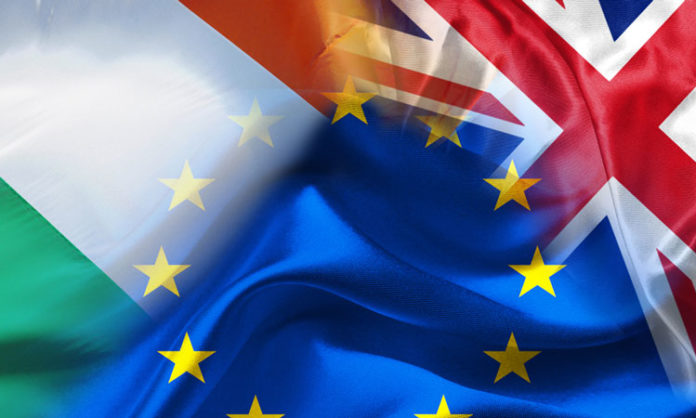Brexit is a word that is used as a shorthand way of saying the United Kingdom is leaving the European Union (EU) – merging the words Britain and Exit to get Brexit. Britain is supposed to be leaving the European Union after a referendum vote was held on Thursday June 23, 2016, to decide whether the UK should leave or remain in the EU. Leave won by 51.9% to 48.1%. The referendum turnout was 71.8%, with more than 30 million people voting. England voted for Brexit, by 53.4% to 46.6%. Wales also voted for Brexit, with ‘Leave’ getting 52.5% of the vote and ‘Remain’ 47.5%. Scotland and Northern Ireland both backed staying in the EU. Scotland backed ‘Remain’ by 62% to 38%, while 55.8% in Northern Ireland voted ‘Remain’ and 44.2% ‘Leave’.
A key part of the Brexit negotiations was about the border that separates Northern Ireland and the Republic of Ireland. The backstop (so-called) is a position of last resort, to maintain an open border on the island of Ireland in the event that the UK leaves the EU without securing an all-encompassing deal. At present, goods and services are traded between the two jurisdictions on the island of Ireland with few restrictions.
The UK and Ireland are currently part of the EU single market and customs union, so products do not need to be inspected for customs and standards. But, after Brexit, all that could change – the two parts of Ireland could be in different customs and regulatory regimes, which could mean products being checked at the border. The UK government does not want this to happen. The EU has also said it does not want any hardening of the border.
The Evening Standard newspaper reported that Britain’s Prime Minister
Theresa May has said she has secured new “legally binding” assurances on the Irish border backstop following hours of talks in Strasbourg with EU leaders. The Prime Minister held discussions with EU Commission president Jean-Claude Juncker, who warned on Monday night: “this is the deal… or Brexit may not happen at all”. Speaking at a joint press conference, Mr. Juncker said “we left no stone unturned” as he and Mrs. May met for last-ditch talks in a bid to secure a compromise.
Leading up to the parliament vote, Mrs. May confirmed an agreement had been reached on legally binding changes to strengthen the Withdrawal Agreement. She urged Members of Parliament (MP) to back her “improved” deal in the meaningful vote on Tuesday. Mr. Juncker warned that if the deal was voted down there would be “no third chance”.
Mrs. May said: “MPs were clear that legal changes were needed to the backstop. Today we have secured legal changes. “Now is the time to come together to back this improved Brexit deal and deliver on the instruction of the British people.” Cabinet Office minister David Lidington earlier said the wording of the changes provide confirmation that the EU cannot trap the UK in the backstop indefinitely. “The backstop is an insurance policy, nothing more, nothing less. The intention is for it not to be used, like in every insurance policy.” Mr. Juncker said he had spoken to Irish Taoiseach Leo Varadkar, who he said had indicated he was “prepared to back this approach in the interests of an overall deal”. Announcing the changes ahead of the press conference, Mr. Lidington said: “This House said it needed legally binding changes, and today that is what the Prime Minister and the Secretary of State have achieved.
But Shadow Brexit secretary Sir Keir Starmer said the change “adds nothing” from the letter Mrs. May returned from negotiations with on January 14. He said: “If all that’s happening is to turn this letter into an interpretative tool for legal purposes, I remind the House what the Prime Minister said on January 14 about this letter. “She said she had been advised this letter would have legal force in international law. “To stand here today and say this is a significant change, when she’s repeating what she said on January 14, is not going to take anyone here far.”
Responding to these developments, Labour leader Jeremy Corbyn had said: “The Prime Minister’s negotiations have failed. “This evening’s agreement with the European Commission does not contain anything approaching the changes Theresa May promised Parliament and whipped her MPs to vote for. “Since her Brexit deal was so overwhelmingly rejected, the Prime Minister has recklessly run down the clock, failed to effectively negotiate with the EU and refused to find common ground for a deal Parliament could support. “That’s why MPs must reject this deal.”
While Mrs. May was in Strasbourg, ministers in the Irish cabinet were summoned to an emergency meeting on Brexit. The Irish premier, Leo Varadkar, who was due to begin his journey to the US for St Patrick’s Day, returned from Dublin airport and was brought back to government buildings for the cabinet briefing. Mr. Varadkar said, “It is far too late for the United Kingdom to tell us what they want. The Withdrawal Agreement requires a compromise and this Withdrawal Agreement is already a compromise.” Mr. Varadkar also reiterated that the threat of a no-deal was not coming from the EU or Ireland, adding that the UK Parliament could take the threat of a no-deal off the table at any time as March 29 is a self-imposed deadline.
British lawmakers voted 391 to 242 against May’s plan Tuesday, 17 days before Britain is to withdraw from the political and economic alliance. The vote meant Britain will have to choose: leaving the EU without a deal; delaying the March 29 departure date; or having a new Brexit vote.













